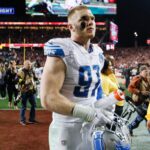
The Detroit Lions led the San Francisco 49ers 24-7 at halftime in the NFC Conference Championship. Only 30 minutes away from their first Super Bowl appearance, all the Detroit Lions’ defense had to do was keep the 49ers from scoring. Defensive Coordinator Aaron Glenn and the Lions’ defense did a masterful job limiting the league’s number-one scoring offense to only seven points in the first half. Then, it all fell apart when the 49ers came storming back to score 17 unanswered points.
How a Rebuilt Detroit Lions Defense Could Lead to a Super Bowl
Jared Goff and the Lions’ offense built up an impressive 17-point lead, and the team dominated the scoring. Victory was within reach, and the Lions faithful could feel it. But the script abruptly flipped in the second half of the game. Instead of the scoring drives that characterized the Lions’ first half, the offense stumbled, committing a costly fumble, two turnovers on downs, and a forced punt. The Lions’ defense needed to carry the team until the offense could regain its rhythm.
30 Minutes Away From The Super Bowl
Meanwhile, Brock Purdy , Christian McCaffrey , and the 49ers shifted into high gear. A team that looked shell-shocked heading into the locker room was suddenly running rampant over an exhausted Lions defense. The 49ers scored 17 unanswered points in the third quarter, tying the game and controlling the time of possession. As the Lions struggled offensively, the 49ers held onto the ball through several long series, and the defense rarely got a break.
The Lions’ strongest defensive players were on the field throughout the first half. When the 49ers began their scoring assault in the second half, the Lions’ defense had already given everything they had, and the well had run dry. Exhausted by the effort of trying to hold back the 49ers’ scoring avalanche, there was no relief in sight. Missing several injured defensive players, the Lions’ bench lacked sufficient depth to give the starters a break.
Perhaps the outcome might have been different if the Lions had a deeper bench of players who could relieve the starters without sacrificing their defensive stronghold.
The Detroit Lions Rebuild Process
Overhauling the Lions’ defense has been a priority in the Brad Holmes and Dan Campbell era. The process began by drafting defensive standout and runner-up for Defensive Player of The Year Aidan Hutchinson. Last year’s draft brought talented rookies Brian Branch and Jack Campbell . While the rushing defense is now ranked as one of the best in the league, second only to the Chicago Bears, there are still gaps in other areas.
Ranked 27th out of 32 teams, the Lions’ pass defense has been named among the worst in the NFL with 274.4 passing yards allowed per game. Giving up an average of 23.2 points per game, the Lions were rated 23rd in scoring. The red zone defense was the Lions’ weakest metric and ranked a dismal 29th.
Recognizing a lack of depth was a critical issue to address this year as the team continued their rebuilding process. The Lions front office used the draft and free agency to fill coverage gaps. The Lions selected Alabama Crimson Tide cornerback Terrion Arnold with their first-round draft pick. Arnold was credited with 63 tackles and five interceptions while at Alabama. He is highly regarded for his speed and agility. 6’0″ tall and 189 lbs., Arnold has the physical strength and fluidity of motion to pose a real threat to opposing quarterbacks.
The Lions’ second draft pick was University of Missouri cornerback Ennis Rakestraw . Drafting another cornerback could be a move designed to ensure multiple options at this position. Known for his skill in man-to-man coverage, Rakestraw can actively disrupt an opponent’s passing game.
Adding Defensive Depth
Establishing depth in this position was critical. Arnold and Rakestraw will compete for the starting assignment against two veteran players. The Lions signed Las Vegas Raiders veteran Amik Robertson through free agency. Known for his great ball-tracking ability, Sports Illustrated regards Robertson as a great fit for the Lions’ style of play. In addition, the Lions traded for former Tampa Bay Buccaneer, Carlton Davis. In 2020, his best season with the Bucs, Davis posted stats of 68 tackles, four interceptions, and 18 broken passes.
Finally, the Lions brought in former Cincinnati Bengals defensive lineman D.J. Reader . Although Reader’s been used primarily against the run, the Lions focused on adding players who could function well in multiple defensive positions. He fits that bill. In addition to acting as a backup to Lions defensive tackle Alim McNeil , Reader can also defend the passing game. Reader was a contributing factor in the Bengals’ success. His only drawback now is that he is recovering from an injury.
The Missing Piece For the Detroit Lions Defense
A vastly improved Detroit Lions defense could be the final piece in rebuilding this team as a legitimate Super Bowl contender. The Lions’ offense has a history of sputtering in the third quarter. While the team typically rallies in the fourth quarter, the Lions could quickly fall behind without a strong defensive effort. Now, with a wealth of options on their bench, the Lions’ defense could have the kind of depth it lacked previously to reach the Super Bowl.
Main Photo: Junfu Han-USA TODAY NETWORK
The post How a Rebuilt Detroit Lions Defense Could Lead to a Super Bowl appeared first on Last Word on Pro Football .
